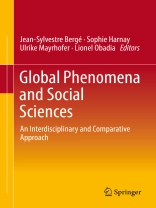This book offers new perspectives on global phenomena that play a major role in today’s society and deeply shape the actions of individuals, organizations and nations. In a complex and rapidly changing environment, decision-makers need to gain a better understanding of global phenomena to adapt and to anticipate the evolution of the global context. The authors—ten renowned international scholars of anthropology, economics, law, management and political science—propose an interdisciplinary and comparative approach to social sciences. They analyse how international phenomena, such as globalisation or transnationalisation, transform the disciplines of social sciences from an epistemological standpoint. Explaining what ‘global’ means in difference disciplines, the authors analyse several global phenomena that characterise today’s international environment such as the circulation of norms and ideas, the linkages between war and globalization, corporate governance, and the impact of multinational enterprises on sustainable development and poverty reduction. Providing examples of analytical disciplinary approaches and guidelines for decision-makers in a fast-changing global context this book will be useful to scholars and students of anthropology, economics, law, management and political science as well as practitioners in the private and public sectors.
İçerik tablosu
Forward.- Introduction.- Chapter 1: Political Science.- Chapter 2: Management.- Chapter 3: Economics.- Chapter 4: Anthropology.- Chapter 5: Law.
Yazar hakkında
Jean-Sylvestre Bergé (Ed.) is a professor of international and European law and intellectual property law at Jean Moulin Lyon 3 University (EDIEC), co-director of a group of Research in European Law (GDR CNRS ELSJ), senior member of the Institut universitaire de France (IUF). He has mobilized three consecutive research themes (interaction between international and European law ; Europeanisation of law ; contextualized global legal pluralism). He is currently working on an interdisciplinary and comparative approach of specific and complex inter-territorial phenomena.
Ulrike Mayrhofer (Ed.) is a professor of International Business at IAE Lyon, Jean Moulin Lyon 3 University where she is responsible for the International MBA and the research group ‘International Business’ at the Magellan Research Center. She is also the President of Atlas AFMI – Association Francophone de Management International. Her research deals with internationalisation strategies and the management of multinational companies.
Sophie Harnay (Ed.) is a professor of Economics at the University of Lorraine and researcher at the laboratory BETA CNRS UMR 7522. She is the author of several articles, books and chapters in the field of law and economics and the economics of institutions. Her research interests include the analysis of the judicial system, law-making in a global context, and the regulation of professions in France and Europe.
Lionel Obadia (Ed.) Ph D in sociology, is a full professor in Anthropology at the University of Lyon 2. He is specialized in religions, cultural diffusion and the issue of Globalization. He has conducted research in Asia, Europe, the Middle East and North America. He is the author of La marchandisation de Dieu (2013), and articles such as Globalization and the Sociology of Religion. In: Bryan Turner (Ed.) The New Companion for the Sociology of Religion, Oxford 2010. He is a board member of the Journal of Religiousand Political Practice.












